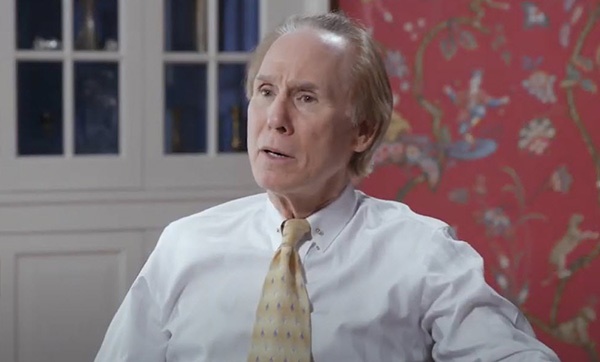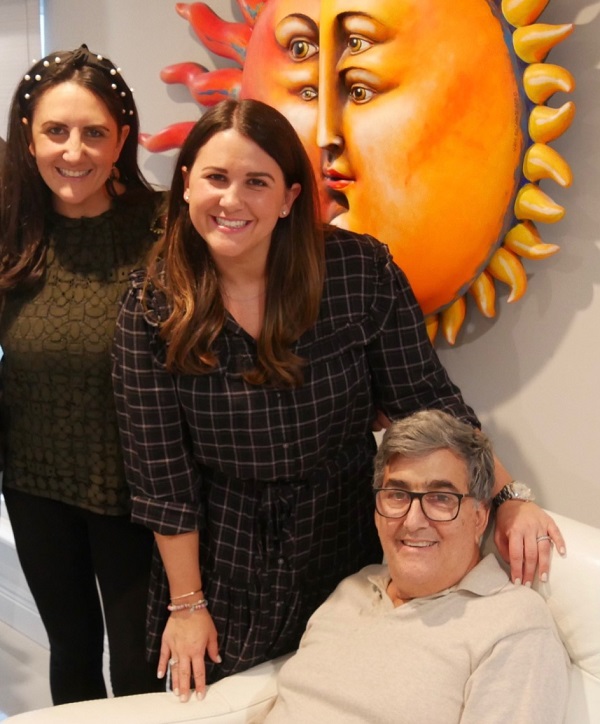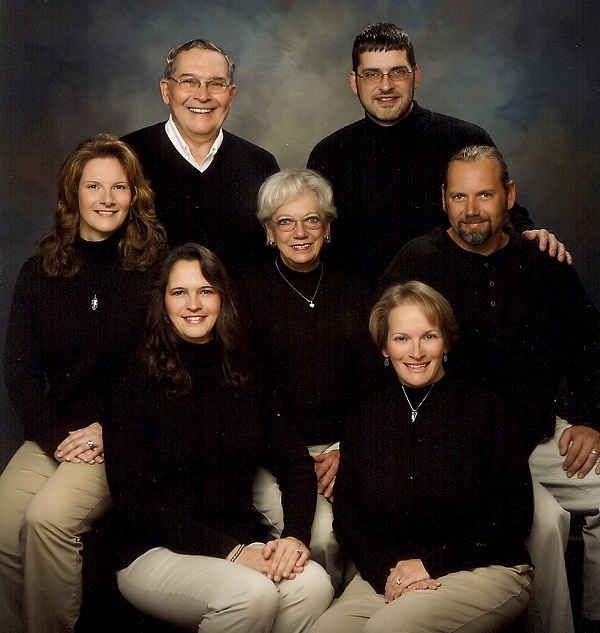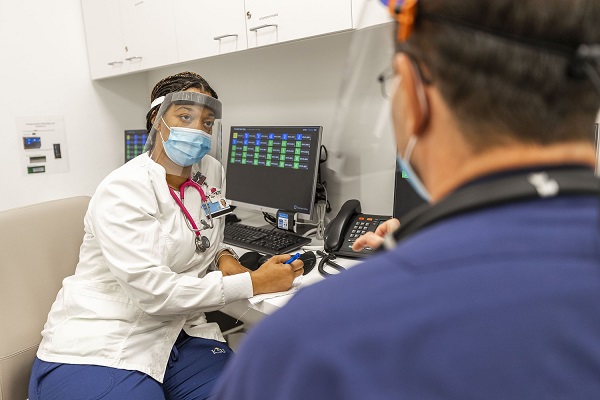- Inspirational Gift Propels New Home and New Vision for Neurological Care
- Cancer Mystery the Focus of Cross-Institutional Collaboration
- Florida Heart Transplant Patient with a “Heart of Gold” Inspires Daughters to Give Back
- Gift Honors Man’s Perseverance
- reCOVer Clinic Helps Patients with Long COVID Syndrome
Inspirational Gift Propels New Home and New Vision for Neurological Care

Can epileptic seizures be caused by stress?
That’s just one of the questions that businessman and philanthropist Charlie Shor is hoping physicians and researchers at Cleveland Clinic will be able to answer someday. Mr. Shor recently committed $5.5 million to fund a novel epilepsy research study, in addition to a $10 million gift toward a new Neurological Institute building on Cleveland Clinic’s main campus and the establishment of The Charles Shor Epilepsy Center.
Success, Despite Stress and Seizures
As a young man, Mr. Shor always considered himself to be in good health. After college, he went to work for the family business, Duro Bag Manufacturing in Kentucky. But his life took an unexpected turn when he was 25, shortly after landing at LaGuardia Airport while on a business trip.
“I was on my way to a dinner where I knew I would be sitting at the head table,” Mr. Shor says. “To my surprise, I got in the cab and I had a seizure.”
After that first incident, the seizures increased in frequency until they were almost daily. He was diagnosed with epilepsy and prescribed medication.
Mr. Shor began to notice a trend – each time he had a seizure, it was connected to a stressful time or event in his life, often happening at airports. He wondered if there was a connection between his seizures and the increasing stress he was experiencing. His father had passed away and Mr. Shor was now Chief Executive Officer. His business prowess eventually propelled the company to become the largest paper bag manufacturer in the world.
Inspired by his own struggles with the illness, in 2002 he started the Charles L. Shor Foundation to fund epilepsy research.
A Personalized Treatment Plan
Although his career and the foundation were thriving, Mr. Shor still searched for the right fit for his medical care and his ideas for research. His quest ultimately led him to Imad Najm, MD, Director of Cleveland Clinic's Epilepsy Center within the Neurological Institute.
Dr. Najm and Mr. Shor worked together on a personalized treatment plan that included some medication but also treatment for sleep apnea and lifestyle modifications, including diet and managing his triggers for stress.
“I'm starting to do yoga every night before I go to bed, which has done a tremendous job helping me get to sleep,” says Mr. Shor. “I'm listening to Mozart instead of the news, and that's another way to reduce stress.”
Today, Mr. Shor typically has one seizure per year.
Shaping the Future Through Research
Mr. Shor is grateful for the progress he has made under the care of Dr. Najm and the other members of his care team at Cleveland Clinic, but he wants others to benefit too. That’s why he’s funding a landmark research study led by Dr. Najm that will examine the effect of health optimization, particularly stress relief, on seizure control and on memory preservation and restoration.
The study will enroll 1,000 patients with epilepsy. Researchers hope to learn new ways to fully control seizures using alternative non-pharmacologic interventions to improve and ultimately prevent memory decline, and to organize international conferences on non-pharmacological stress control interventions and their effects on both seizure control and memory function.
A New Vision for Neurological Care
In addition to the epilepsy research, Mr. Shor is excited about plans for the new Neurological Institute building, which will house The Charles Shor Epilepsy Center.
Still, Mr. Shor believes it’s the people who work in the building who matter most. Referring to Cleveland Clinic’s guiding principle, he says, “Putting ‘Patients First’ makes a patient’s confidence so much stronger, but it also makes the doctors cognizant of why they’re there, what needs to get done and why it gets done. And no matter who you are – all patients are going to be treated extremely well.”
Mr. Shor says he’s motivated by the idea that the future of epilepsy treatment will look different than it does today. He also hopes that his story will inspire others to know that living with epilepsy should not deter them from achieving their goals.
“I'm here today because I've been very fortunate,” he says. “I've had a very successful business career and I want companies to realize that just because someone has a seizure or someone has epilepsy, it does not mean they can't create value and they can't be successful.”
How You Can Help
Gifts of all sizes help researchers and physicians at Cleveland Clinic provide better care for patients. Help make an impact by making a gift today.
Cancer Mystery the Focus of Cross-Institutional Collaboration

A multidisciplinary team of researchers from Cleveland Clinic’s Lerner Research Institute and the Fred Hutchinson Cancer Research Center are collaborating on a study to investigate a potential link between bacteria and cancer. The research is supported by a three-year, $1 million grant from the W. M. Keck Foundation, one of the nation’s largest philanthropic organizations.
“Our goal is to look for evidence of very specific bacteria-associated changes in human cancer DNA,” says project co-lead Angela Ting, PhD, a Cleveland Clinic researcher in the Genomic Medicine Institute.
Turning Genes On and Off
Dr. Ting studies the role of epigenetic gene regulation in cancer, where genes are switched on and off through molecular modifications rather than genetic mutations that change the DNA code. She has teamed up with two Fred Hutch researchers, Christopher D. Johnston, PhD, a synthetic microbiologist who studies the epigenetics of bacteria living in and on the human body, and Susan Bullman, PhD, a cancer microbiome expert.
Together, they are investigating a new way they suspect bacteria may be able to cause cancer by modifying human DNA through a biological process called DNA methylation. By attaching a methyl group to a DNA segment, genes can be activated or repressed without changing the actual DNA sequence.
“DNA methylation is one of the key global epigenetic changes that we see throughout cancer,” explains Dr. Ting. “There have been countless examples of how abnormal methylation can very effectively turn off tumor-suppressor genes, which then promotes cancer development and cancer growth.”
How these carcinogenic methylation changes begin remains an unsolved mystery. “It’s one of the biggest questions in the field of medicine, and one our specific project hopes to address,” Dr. Ting adds.
The Bacteria-Cancer Connection
It is well established that the human microbiome influences many aspects of a person’s health, including cancer risk. For example, infection caused by the common gut bacterium Helicobacter pylori is a leading risk factor for stomach cancer. What is not understood are the specific molecular mechanisms at work.
Dr. Ting and her fellow researchers propose that cancer-causing methylation changes may arise from defensive strategies evolved by bacteria to ward off invading viruses. They will test their hypothesis using Fusobacterium nucleatum, a bacterium closely associated with colorectal cancer.
If their hypothesis proves true, it will be a paradigm shift in our understanding of cancer development that could lead to new cancer prevention strategies, better diagnostics and more-tailored treatments.
High-Risk, High-Reward Research
Obtaining funding is extremely competitive for highly innovative research that could potentially create paradigms or challenge existing ones. Much of today’s financial support for research encourages incremental advances in science and technology rather than the high-risk, high-reward research that can lead to breakthroughs.
Established in 1954 and based in Los Angeles, the W. M. Keck Foundation is a leader in grant making that supports pioneering efforts in the areas of medical research, science and engineering.
“When we got the funding, I stepped into the lab and said, ‘We finally have the money to turn science fiction into science reality!’” recalls Dr. Ting, whose lab will receive $335,050 of the Foundation’s award shared between the labs of the three research collaborators.
The first step for the team will be to develop the novel tools and methodologies needed to explore this new field.
How You Can Help
Foundation grants and donor support make it possible for Cleveland Clinic to conduct transformative research and drive medical innovation. Your support will help accelerate this vital work. Please make a gift today.
Florida Heart Transplant Patient with a “Heart of Gold” Inspires Daughters to Give Back

After Richard Berg’s successful heart transplant at Cleveland Clinic Florida, his daughters Courtney and Samantha searched for a meaningful way to honor their father by giving back to the community.
Their search resulted in Goldie Lev, a jewelry company that sisters Courtney Berg Rosen and Samantha Berg Pace created that gives 20% of all proceeds from their bracelet and mask chain sales to foundations that make a difference to save lives.
In Hebrew, “lev” means heart. The company’s name, which translates to “golden heart,” was dedicated to their father since he’s known for having a heart of gold.
“Every piece we create has a small gold heart on it, which symbolizes the strong, kind-hearted man our father is,” says Courtney, “but it also helps to tell our story.”
A few years ago, Richard underwent critical open heart surgery at Cleveland Clinic in Ohio. After his surgery, he was carefully monitored at Cleveland Clinic Weston Hospital, where his doctors continued to assess his health for nearly five years.
Last year, his doctors said he needed a new heart. He spent a month at Cleveland Clinic Weston Hospital, where he had his heart transplant. Today, Richard is grateful to be alive and continues to maintain close relationships with his doctors in Cleveland and Weston.
“Cleveland Clinic saved our father's life,” says Samantha. “We will forever be grateful to his team of doctors and the staff at Cleveland Clinic for giving our father another lease on life.”
Over the past few months, Goldie Lev has partnered with a number of foundations that help save lives, but Cleveland Clinic holds a special place in their hearts.
In appreciation, Courtney and Samantha have made a gift to the cardiovascular and transplant programs at Cleveland Clinic Weston Hospital in honor of their father’s team of physicians.
Their donation will support transplant education and research initiatives, in honor of Cardiothoracic Surgeon Cedric Sheffield, MD, and research projects and training for cardiology fellows, in honor of Cardiologist Viviana Navas, MD, Director of the Cardiology Fellowship program.
No. 1 Heart Transplant Program for Quality in Florida
Cleveland Clinic Florida’s Transplant Center is a leader in heart, liver and kidney transplantation in South Florida. Led by world-renowned transplant surgeons, the team has transplanted over 1,000 life-saving organs, making it one of the fastest growing programs in the region.
Cleveland Clinic Florida’s heart transplant program began in 2016. Recently, the Scientific Registry of Transplant Recipients (SRTR) released its provider-specific report and recognized Cleveland Clinic Florida as the fourth-best heart transplant program in the country for quality and 15th nationally for volume with 47 heart transplants.
SRTR also recognized Cleveland Clinic Florida’s heart transplant program as No. 1 for quality in the state of Florida and No. 3 for volume.
These are significant achievements for Cleveland Clinic Florida, especially as it is being measured against much larger hospitals with heart transplant programs that have been in existence longer.
Advancing Life-Saving Care in Florida
Your gift supports life-saving care at Cleveland Clinic Florida. As a top destination for heart and transplant care, we need your support to invest in new technology, drive research breakthroughs and train tomorrow’s transplant and cardiology physicians. Make your gift today.
Gift Honors Man’s Perseverance

The Roger and Patricia Hasselman family of Elk County, Pennsylvania, is honoring the memory of Roger Mark Hasselman with a gift supporting medical advancement and innovation at Cleveland Clinic.
Patricia Hasselman, Mr. Hasselman’s wife of 48 years, and their five children knew him to be a private, humble and hardworking man, who brought a spirit of persistence to all that he did.
“Dad’s life had many hardships but he never threw in the towel,” says Jane Hasselman Bryndel of her father who died in June 2019 at the age of 85. “He chewed through every challenge that came his way.”
The family sees that same drive to overcome obstacles and solve problems in the physicians, scientists and researchers at Cleveland Clinic.
Forging a Legacy
Growing up, Mr. Hasselman had an affinity for machines, much like his father, a hands-on engineer with an eighth-grade education. He was the first in his family to graduate college, earning a bachelor’s degree in mechanical engineering from Pennsylvania State University. He also studied at the University of California at Los Angeles for a short time, while working in the aerospace industry.
After being drafted into the U.S. Army and stationed at Red Stone Arsenal in Huntsville, Alabama, Mr. Hasselman made his brief contribution to the space program, helping test rockets. He then returned to Elk County and entered the business of powder metallurgy, a metal-forming process performed by heating compacted metal powders.
In 1972, Mr. Hasselman joined Alpha Sintered Metals Inc. as a partner and for 32 years steered the company through good times and bad, including flood and fire. He used his talent to design and manufacture powder metal parts for the automotive and outdoor power equipment industries.
“Roger was a respected and successful businessman, a true captain of industry,” says Mrs. Hasselman. “All of his employees, customers and vendors respected him.”
The company’s unique gainshare system, which generously provided more than $17 million in bonuses to employees over 17 years, epitomizes the work ethic Mr. Hasselman expected of himself and instilled in others. “He made employees feel like owners, and they in turn gave the very best of themselves,” recalls Mrs. Bryndel, who worked alongside her father in the business for many years prior to his retirement in 2004.
A Community Builder
Mr. Hasselman was not content to simply build a successful business, though it had a considerable impact on the local community. He gave of his time serving on a number of boards, including Ridgway Industrial Development Corp., a privately funded non-profit focused on economic development in the region, and Elcam, Inc., a social business enterprise supporting community needs with an emphasis on persons with mental and physical challenges.
“My husband was a hard worker at everything he did, whether in his office, at home or on a board,” says Mrs. Hasselman.
She notes his work on a local hospital board for many years gave Mr. Hasselman a unique understanding of rural healthcare issues as well as a deep appreciation for Cleveland Clinic’s contributions to the advancement of medicine.
“When Mom and Dad faced health challenges, they trusted Cleveland Clinic,” adds Mrs. Bryndel. “That is why we chose to honor Dad’s memory with a gift that will support the Clinic’s long-term goal of advancing cancer and heart care, as well as more immediate needs related to the COVID pandemic.”
“Mr. Hasselman’s perseverance and desire to lift up others in his community mirrors the tireless efforts and dedication of our caregivers, researchers and scientists at Cleveland Clinic,” says Serpil Erzurum, MD, Chief Research and Academic Officer, overseeing basic, translational and clinical research at Cleveland Clinic. “We are grateful for the family’s generous support and proud to be part of his legacy.”
How You Can Help
Gift giving is a powerful way to honor the memory and legacy of loved ones and support your family’s charitable goals. Learn more here.
reCOVer Clinic Helps Patients with Long COVID Syndrome

Cleveland Clinic patients who have persistent COVID-19 symptoms can now gain access to a wide variety of specialists and resources through a centralized reCOVer clinic evaluation and referral process.
The reCOVer clinic collaborates with Cleveland Clinic specialists from 18 different clinical areas, including cardiology, pulmonology, dermatology, ear nose and throat, and neurocognition to understand and address the individual needs of patients with COVID-19 symptoms lasting more than 28 days, known as long COVID or Post-Acute Sequelae of COVID-19.
Taking a Closer Look
“There is currently research going on to determine how many people with COVID-19 infections have symptoms that do not resolve,” says Kristin Englund, MD, an infectious disease physician who leads the reCOVer clinic. “However, we know that patients with lingering COVID-19 symptoms aren’t necessarily those who were hospitalized with severe cases initially. Many patients have had a fairly mild infection, yet symptoms have persisted more than four weeks or potentially worsened after time.”
All patients in the reCOVer clinic, regardless of symptoms, will first undergo a series of evaluations and exams, which may take several weeks to complete. This includes an in-depth health history and questionnaires; cardiac, pulmonary and physical therapy tests; blood tests; and neurocognitive and behavioral health screenings. Once these are complete, patients will meet with reCOVer clinic providers to discuss the results and individual next steps. Depending on a patient’s results, symptoms and needs, clinical experts will determine the best care path moving forward and connect the patient with Cleveland Clinic specialists with specific expertise in long COVID-19 for continued care.
A Commitment to Help
Philanthropic support is helping to make the new initiative a reality. The Kelly family of Tennessee recently made a generous gift to the clinic in honor of Michael Kelly’s pulmonologist, Joseph Parambil, MD. “It's been such a tough year for everyone,” says Wendy Kelly. “We knew there were COVID survivors out there still experiencing seemingly never-ending symptoms. We thought this would be a great opportunity to help.”
“We are committed to helping these patients, whose lives have been interrupted for weeks or months due to long COVID-19 symptoms,” says William Lago, MD, a family medicine physician who also was involved in the development of the reCOVer clinic. “Like COVID-19 itself, long COVID-19 can include a wide array of symptoms such as chest pain, shortness of breath, persistent fatigue and memory difficulties. However, many other factors also can contribute to what our patients are experiencing. This is a complex condition and one that we are understanding more about every day. By taking the time to perform multidisciplinary, comprehensive evaluations, we believe we can best partner with our patients in putting together treatment plans and setting them on a path to wellness.”
The clinic sees adult patients who have had a positive PCR test result and have persistent COVID-19 symptoms that have lasted 28 days or longer after their initial positive PCR test result. The reCOVer clinic, while located at the Cleveland Clinic Independence Family Health Center, serves patients throughout Northeast Ohio via virtual platform. Currently, the clinic sees Cleveland Clinic patients by referral, but plans to expand services to any long COVID patient in the future.
For patients who aren’t sure if they are experiencing long COVID-19 syndrome, Dr. Englund recommends they start by contacting their primary care physician.
How You Can Help
Your gift to our COVID-19 Response fund supports critical research and patient care. Please make a gift today.

